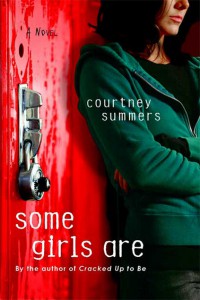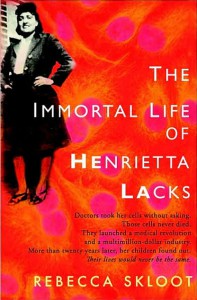The ALA Banned Books Week website and lists give us a “big picture” view of how often specific authors and works are challenged in America, but the lists don’t help us see how these challenges and bans occur in specific schools and communities.
Want to stay informed about current book bans? Following the Office for Intellectual Freedom Blog is a great way to keep up:
- OIF Blog: http://www.oif.ala.org/oif/
These recent stories are just a sampling of this broader issue. They provide local context and show how authors and readers are able to push back through blogs and social media to raise awareness and encourage the freedom to read when a book is threatened with local censorship.
- 2015: The Immortal Life of Henrietta Lacks – Knoxville, TN
- 2015: Some Girls Are – Charleston, SC
- 2013: Persepolis – Chicago, IL
The Immortal Life of Henrietta Lacks, by Rebecca Skloot
In Knoxville, TN, a local mother found the book on her son’s high school summer reading list and objected to it, describing the book as “pornographic.” She is currently working to have it removed from the school’s summer reading list.
News Coverage
This in-depth review from the local news station includes the author’s response, interviews with the parent who is leading the challenge and a review of the book challenge process:
Author’s Response
The author also reached out to her readers to help her address the situation directly by supporting a local teacher’s crowdfunding campaign to provide direct access to the book in the middle of the controversy:
School’s Response
The Vice Principal Jim Allen also chimed in to provide more context in a comment on Rebecca Skloot’s Facebook posts:
“Know that the book and teachers have the complete support from the administration of the school. It’s an amazing book that fits with our STEM curriculum better than almost any book could! The next book that the sophomores are reading? Fahrenheit 451… Oh, sweet, sweet, irony.” – Jimm Allen
Chicago-Kent Connection
 Chicago-Kent’s Professor Lori Andrews is very familiar with the legal ethical issues raised in The Immortal Life of Henrietta Lacks since she and her co-author also covered the story of Henrietta Lacks in their 2000 book, Body Bazaar: The Market for Human Tissue in the Biotechnology Age. Professor Andrews caught up with Rebecca Skloot on her book tour in 2010 when she spoke at the Northwestern Medical School and wrote about their encounter on the ISLAT Blog.
Chicago-Kent’s Professor Lori Andrews is very familiar with the legal ethical issues raised in The Immortal Life of Henrietta Lacks since she and her co-author also covered the story of Henrietta Lacks in their 2000 book, Body Bazaar: The Market for Human Tissue in the Biotechnology Age. Professor Andrews caught up with Rebecca Skloot on her book tour in 2010 when she spoke at the Northwestern Medical School and wrote about their encounter on the ISLAT Blog.
Some Girls Are, by Courtney Summers
 Challenge Context
Challenge Context
West Ashley High in Charleston, SC removed this book from the high school summer reading list after one parent was disturbed by sexual references while reading the book with her daughter. The mother started by writing a letter to the editor in the local newspaper, then demanded the school remove the book from the reading list, and the school library, and only provided to children whose parents specifically give them permission.
Responses Online
Courtney Summers wrote about the ban on her tumblr, saying:
I’m sorry Some Girls Are will not have the chance to be read, contemplated, and discussed in a school environment and more than that, that it might not have the chance to reach the teens at West Ashley High who need it. I hope they’ll find it, in spite of its removal from the summer list.
Another author and a former librarian, Kelly Jensen, organized a donation drive, asking readers to help send copies of the books to the young adult library collection at the Charleston County Public Library.
She posted pictures of the books as they came in and were distributed by the local young adult librarian:
The book drive sent 830 copies. The news got out and more people started sending copies, until the final total roese to nearly 1,000 books available for free to any reader in the area:
- Fans of banned book ‘Some Girls Are’ donate hundreds of copies to Charleston library
Paul Bowers | Sep 9 2015 | The Post and Courier
Challenge Context:
From the Newsletter on Intellectual Freedom, May 2013, pp. 103–4:
Persepolis was removed, via a district directive, from all Chicago, Ill. public schools (2013) due to “graphic illustrations and language” and concerns about “developmental preparedness” and “student readiness.
” Seventh- and eleventh-grade students study the graphic novel about the author’s experience growing up in Iran during the Iranian revolution as part of Chicago Public Schools’ Literacy Content Framework.
As the news spread of the directive, students mobilized a media campaign in opposition to “banning a book that’s all about the freedom of speech.” Students took to their Facebook and Twitter accounts, checked out all library copies of the book, wrote blogs, sent e-mails, wrote investigative articles for the student newspaper, contacted the author, staged protests, and appeared on local radio and television programs.
Eventually, the school issued a letter telling high school principals to disregard the earlier order to pull the book.
- Text of the original directive
- CEO Barbara Byrd-Bennet’s email response (noting why it should be removed)
- Office for Intellectual Freedom response
Student Response:
A student at Lane Tech High School wrote about the ban in the school newspaper, reaching out to the author for commentary:
- Lane reacts to CPS ban of graphic novel Persepolis
By Gabrielle Onyema & Matthew Wettig | June 13, 2013 | Lane Warrior
The author Marjane Satrapi’s wrote in response:
“America is the largest democracy in the world!!! Why? The question turns round and round in my head and I don’t have any answer. And I feel sad. And I am ashamed of people who take these kinds (of) decisions. No matter who they are, SHAME ON THEM!”
(the author’s letter is no longer available on the school website, but she is quoted in a Chicago Tribune article)
Other students at Lane Tech High school participated in a public protest over the book ban:
- Lane Tech Students Protest CPS Stance on ‘Persepolis’
By Patty Wetli | March 15, 2013 6:14pm | dnainfo.com/chicago
The Illinois Library Association later presented the school with an award for their advocacy:
- Lane Tech students earn Intellectual Freedom Award after protesting ‘Persepolis’ book ban
by SUN-TIMES WIRE | 11/01/2013, 06:33PM | Chicago Sun Times

